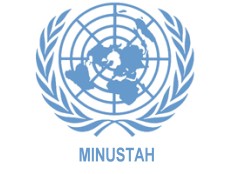|
|
|

Haiti - Justice : Situation of Human Rights in Haiti
22/04/2013 10:01:02
 |
 |
Thursday, the Section of human rights of the Minustah / High Commissioner for Human Rights in Haiti, issued an interim report on the situation of human rights in Haiti. The report analyzes the evolution of the situation of human rights, the progress achieved, the challenges ahead and made recommendations. It examines in particular the various legislative, administrative and judicial measures taken by the Government of Haiti, the situation in terms of rule of law and impunity, protection of human rights in humanitarian response, as well as the integration of human rights into public policies. Among the recommendations to the attention of the State :
- Take legal, administrative and financial measures to institutionalize a permanent State organ charged with drafting national reports for international human rights treaty bodies and following up on the implementation of recommend ations from the Universal Periodic Review.
- Submit government reports to the human rights treaty bodies, in particular:
- Periodic reports to the Committee on the Elimination Racial Discrimination, due since 2000;
- Periodic reports to the Committee on the Rights of the Child, due since 2007;
- The initial report to the Committee on the Rights of Persons with Disabilities, due since 2011.
- Ratify, as announced by the Prime Minister during the High Level Meeting on the Ruleof Law held in New York in September 2012, the following human rights treaties:
- The Convention against Torture and Other Cruel, Inhuman or Degrading Treatment or Punishment;
- The International Convention for the Protection of All Persons from EnforcedDisappearance;
- The International Convention on the Protection of the Rights of All MigrantWorkers and Members of their Families;
- The 1954 Convention relating to the Status of Stateless Persons and the 1961Convention on the Reduction of Statelessness;
- The Rome Statute establishing the International Criminal Court.
- Promulgate the Law ratifying the International Covenant on Economic, Social andCultural Rights that was adopted by the Parliament,and deposit an instrument ofaccession so that the Covenant can enter into force.
- Finalize as quickly as possible reform of the Criminal Code and the Code on CriminalProcedure, the final drafts of which have been submitted to the Ministry of Justice.
- Commit to publish in the Official Gazette,Le Moniteur,laws adopted by the Parliamentand promulgated by the President, so that the population is informed of its rights andduties. Specifically, the Law ratifying the International Covenant on Economic, Socialand Cultural Rights (adopted by the Parliament on 31 October 2012), the Law onPaternity and Filiation (voted by the Senate on 12 April 2012) and the Decree on theState of Emergency (adopted on 30 October 2012), should be published.
- With assistance of the international community, continue to support the consolidation oftheOffice de la protection du citoyen, especially with regard to its establishment ofregional offices and facilitation of its cooperation with civil society.
- Allocate an operating budget to the Minister for Human Rights and the Fight against Extreme Poverty.
- With support of the international community, the Housing and Public Buildings Unitshould adopt and implement a global strategy, especially a housing policy, in order torespond to the needs of displaced persons living incamps, prevent forced evictions anddevelop a vision for urban development that is respectful of human rights.
- The Parliament should adopt a legislative frameworkin accordance with the Protocol toPrevent, Suppress and Punish Trafficking in Persons, especially Women and Children, supplementing the United Nations Convention against Transnational Organized Crime, ratified by Haiti in 2011.
- The Executive, in the interest of transparency, should provide an account to theParliament of the use of funds during the state of emergency.
- Formally prohibit the use of parallel security forces made up of armed civilians by local elected and appointed officials.
Among the importants developments of the periode covered, the report note the promulgation of the Law on the Organization and the Functioning of the Haitian Ombudsperson (Loi portant sur l’organisation et le fonctionnement de l’Office de la protection du citoyen) on 20 July is one of the most notable improvements. It guarantees the independence of the Ombudsperson’s office, defines its status and role and provides the framework for an independent national human rights institution.
Also the Human Rights Section documented a number of cas
es of local administrative and judicial authorities using parallel security forces made up of civilians to perform various functions pertaining strictly to police authorities. Certain local political figures have established civilian brigades ostensibly to guarantee their security. The constitution of such groups is particularly worrisome in a pre-electoral context.
The second half of 2012, the Human Rights Section documented several cases of apparent excessive use of force and ill-treatment by members of the Haitian National Police, during forced evictions, suppression of protest demonstrations, anti-criminality operations and other incidents.
The authorities’ efforts to prevent and suppress lynching remain insufficient. Similarly, the judicial response to acts of sexual violence is still inadequate in Haiti and the recommendations that the Human Rights Section made in its public report of June 2012 have largely not been implemented.
With regard for economic and social conditions, the period under review was marked by demonstrations throughout the country against the high cost of living, unequal distribution of electricity, inadequate infrastructure, lack of sufficient access to adequate housing, the persistent cholera epidemic and insecurity. This report insists on the importance of consulting and taking into account the opinions of civil society on public policies.
HL/ HaitiLibre
|
|
|
|



